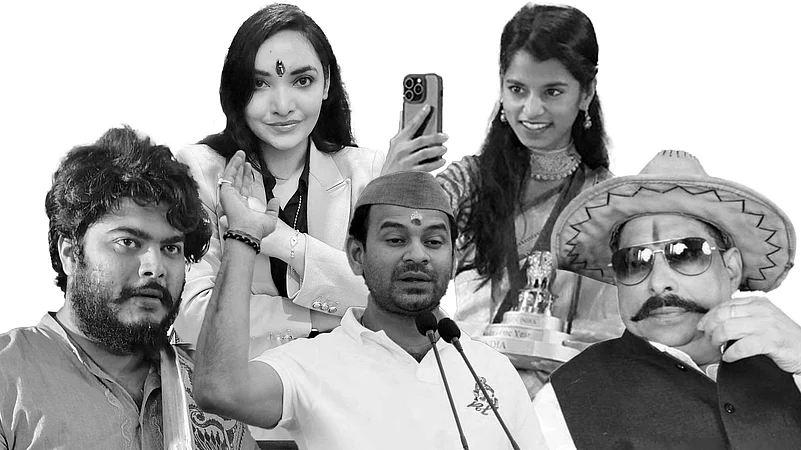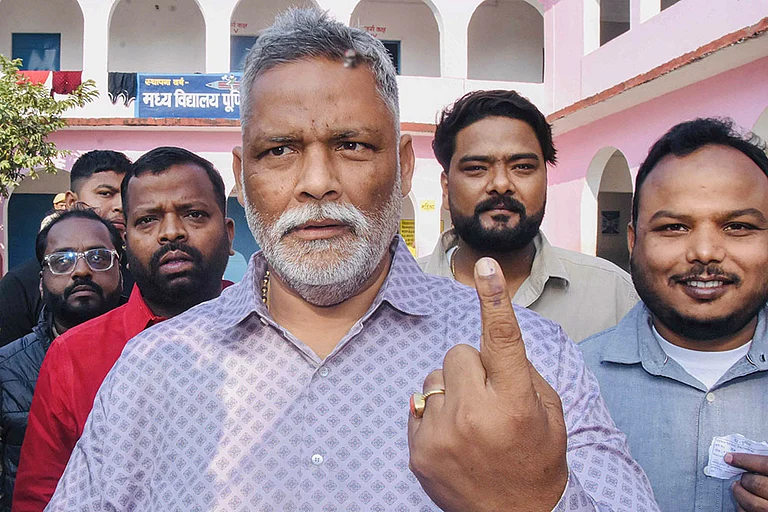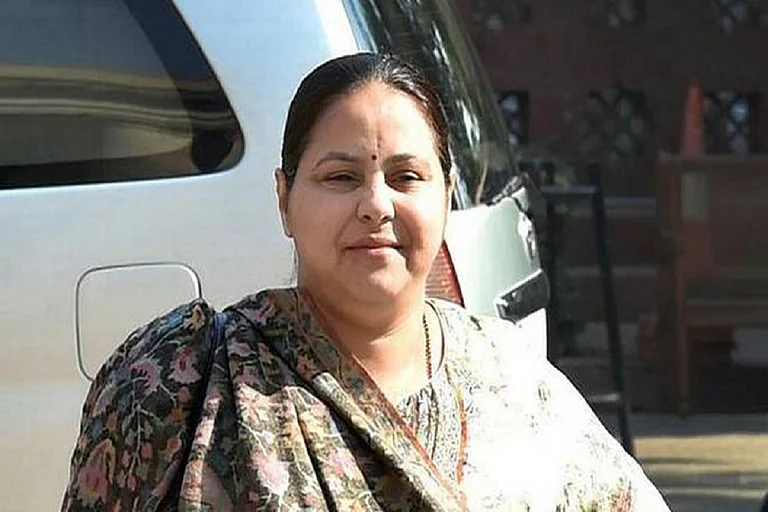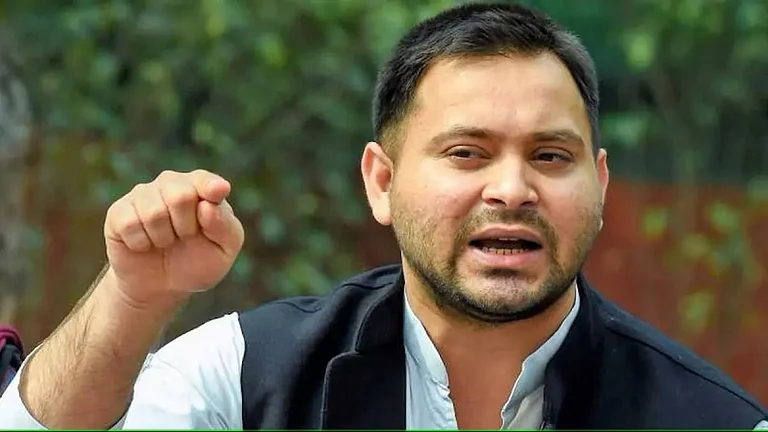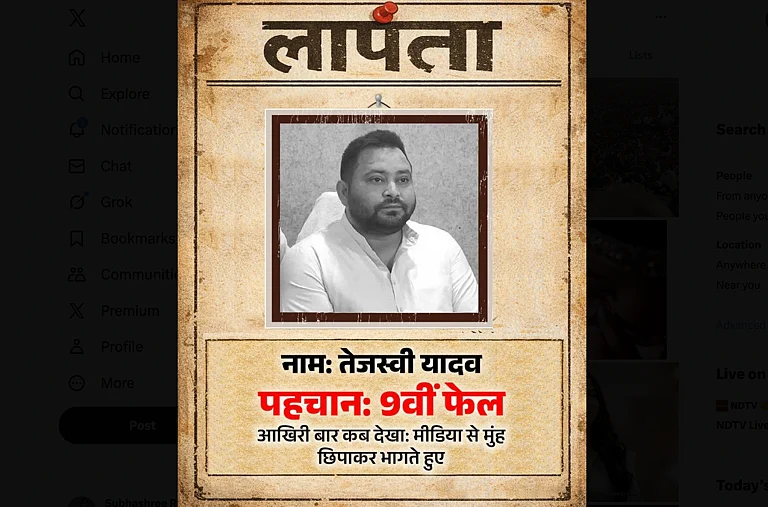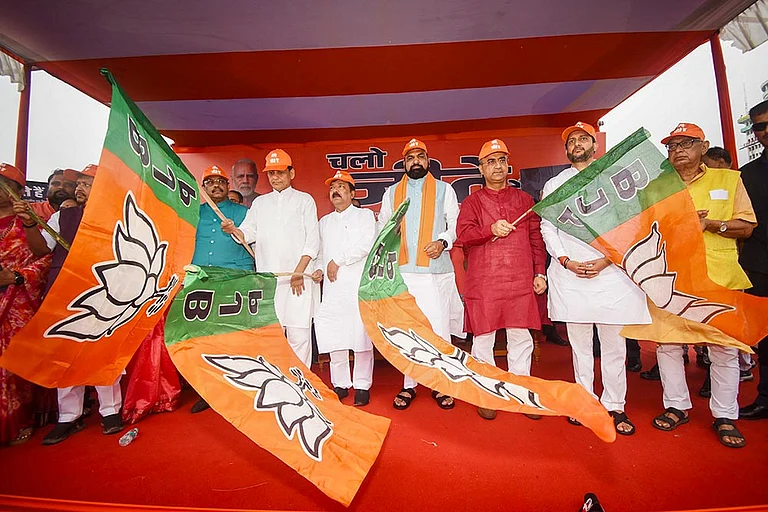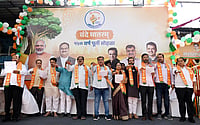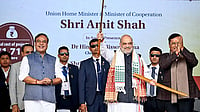
Tej Pratap Yadav's JJD rebellion and Khesari Lal Yadav's pop-star RJD campaign defy Bihar's political norms with drama and charisma.
Maithili Thakur (BJP) leverages her musical fame, while Pushpam Priya's Plurals Party pushes cosmopolitan ideals across all seats.
Anant Singh's bahubali influence (JD(U)) and Osama Shahab's inherited RJD candidacy revive muscle and dynasty politics.
Bihar’s political landscape has long been shaped by caste equations and social engineering. Yet, every election throws up a few mavericks — candidates who either defy the rules of conventional politics, reject the dominance of major political parties, or challenge the moral compass of politics in the state. The 2025 state elections are no different.
From Pushpam Priya’s cosmopolitan idealism to Tej Pratap Yadav’s rebellion, from Khesari Lal Yadav's vulgar songs to Maithili Thakur's melodious voice, and from Anant Singh’s muscle power to Osama Shahab’s inherited influence, these figures represent the extremes and diversity of Bihar’s political imagination.
These mavericks are generally not taken seriously by realpolitik strategists, yet they symbolize the restless energy of Indian democracy. In many ways, they remind us that Bihar politics is never just about governance, it is also a theatre which thrives on spectacle.
Tej Pratap Yadav: The elder son of RJD patriarch Lalu Prasad Yadav is popularly seen as the “Rebel Prince,” yet he defies every attempt to pigeonhole him. He quotes Krishna in public rallies, wears saffron robes, and rides horses to temples. His political persona is defined by drama, unpredictability, and a generous dose of spiritual eccentricity. His constant public spats — with his brother Tejashwi, his party, and even his estranged wife — have kept him in the headlines.
In his campaign speeches, he invokes his father’s socialist legacy even as he blames the RJD for “losing its soul.” He doesn’t forget to add anecdotes about his childhood fights with Tejashwi. Expelled from the RJD in May 2025 after a prolonged family feud, he is contesting this election from Mahua under his new banner, the Janshakti Janata Dal (JJD).
A day after his younger brother and RJD leader Tejashwi Yadav filed his nomination papers from Raghopur in Vaishali district in the presence of their parents, Tej Pratap filed his own from the adjoining Mahua Assembly constituency, carrying a photograph of his grandmother, Marchhayiya Devi, in hand. Before filing his nomination papers, he emphasized the importance of his family’s blessings, saying, “I have received blessings from my parents and my grandmother.”
Tej Pratap first won the Mahua seat in 2015, becoming an MLA for the first time. In 2020, he shifted to Hasanpur in Samastipur and won again. Whether he wins or loses this time, his flamboyant persona and unpredictable rhetoric make him one of the most watched — and meme-worthy — candidates in this election.
Khesari Lal Yadav: The figure of a pop-star politician was the one missing piece from Bihar’s electoral drama — until now. Khesari Lal Yadav, the Bhojpuri film superstar, YouTube sensation, and now the RJD candidate from Chhapra, has filled that role perfectly. His rise from selling litti-chokha on the streets of Delhi to becoming one of the highest-paid Bhojpuri actors is what endears him to his followers. His songs — often accused of being lewd or “vulgar” — have drawn millions of views and equal outrage.
His fan base overlaps neatly with key voter groups: the rural poor, the migrant labourers, and the Bhojpuri-speaking youth who dream of breaking free from class constraints. Yadav’s campaign rallies feel more like music concerts, with selfie-hungry crowds and loudspeakers blaring his hits. Yet behind the glitz lies an intriguing paradox.
Khesari represents both aspiration and defiance — the self-made man who doesn’t speak English or polish his diction for Delhi media. His “vulgarity” is also a political statement: that the culture of Bihar’s masses deserves the same stage as that of its elites.
Maithili Thakur: Ms. Thakur, known as the “Voice of Mithila,” is a classically trained singer from Benipatti in Madhubani. She rose to fame through television reality shows and YouTube renditions of Maithili folk songs, classical ragas, and bhakticompositions. Her voice became a source of cultural pride for Mithilanchal. In October 2025, Maithili joined the Bharatiya Janata Party and filed her nomination papers from Alinagar in Darbhanga.
Pushpam Priya Choudhary: The founder of The Plurals Party, embodies an outsider’s dream in a deeply entrenched political order which is the politics of Bihar. Educated at the London School of Economics and the University of Sussex, she entered Bihar politics in 2020 with the slogan of making “everyone a ruler.”
Predictably, she failed to make a significant impact in the 2020 State Assembly polls, securing just 5,189 votes herself. She had fielded 148 candidates who, on average, received only 1,415 votes.
Unfazed by that crushing defeat, Pushpam has relaunched her political experiment for 2025 with renewed aggression. Ms. Choudhary, who is almost always seen wearing a mask, has announced that her party will field candidates in all 243 seats. Her critics dismiss her as a social media creation with limited ground presence, but her persistence ensures she remains part of the conversation about Bihar’s political future.
Anant Singh: If Pushpam Priya represents Bihar’s cosmopolitan modernity, Anant Singh stands for its “muscle power.” Known as “Chhote Sarkar” in his constituency of Mokama, Singh is the archetypal bahubali. With over two dozen criminal cases against him, Singh’s rise from village strongman to multi-term MLA shows how such figures continue to thrive in North Indian politics. In 2025, he is contesting again — this time with the JD(U) — and has declared assets worth ₹37 crore, along with 28 criminal cases.
Singh’s supporters describe him as a “protector” who ensures order where the state fails; his critics see him as a relic of Bihar’s lawless past. Yet, election after election, Mokama has voted for him or for his proxies, suggesting that the appeal of the bahubali — part benefactor, part enforcer — still resonates deeply with many voters.
Osama Shahab: The son of the late Mohammad Shahabuddin, has been fielded by the RJD from Raghunathpur. His father — once an MP, later a convict — was among Bihar’s most feared and influential figures. After Shahabuddin’s death in 2021, the family’s political hold waned, but Osama’s candidature is seen as an attempt to reclaim that ground.
The RJD’s decision to field him is a calculated gamble: that Shahabuddin’s name, despite its baggage, still commands loyalty in Siwan. For many, Osama represents continuity — a young face bearing an old surname. For others, his rise revives the uneasy question of whether Bihar has truly moved beyond the politics of intimidation and personality cults.







